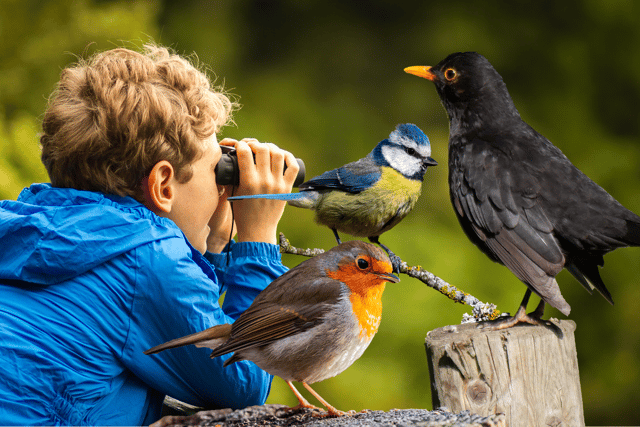Big Garden Birdwatch 2024: How to help the RSPB help Britain's garden birds this weekend - in just one hour
This article contains affiliate links. We may earn a small commission on items purchased through this article, but that does not affect our editorial judgement.
and live on Freeview channel 276
Britons are being urged to park up in their backyards this weekend to count finches, thrushes, and tits - to help experts get a clearer picture of how well the UK's garden bird species are doing.
The Royal Society for the Protection of Birds' (RSPB) Big Garden Birdwatch kicks off this Friday (26 January) and continues throughout the weekend. Last year's event saw more than half a million people take part, counting some 9 million birds in their local gardens, balconies, parks, allotments, school grounds - and even from narrowboats parked up in canals.
Advertisement
Hide AdAdvertisement
Hide AdThe annual count helps experts assess the health of Britain's garden bird populations. But with new government research suggesting that a million fewer people are spending time in the outdoors than they did during the 2020 lockdown, it also provides a chance to reconnect with nature - and score some of the positive mental health benefits nature can bring.
So how exactly can you take part, and are there any tips or tricks to make your count easier? Here's everything you need to know:
How to take part in the Big Garden Birdwatch this year
Taking part in the Big Garden Birdwatch is pretty simple. First of all, you should pick a good space to observe the birds from, such as your garden, a local park, your balcony, your school or workplace - anywhere frequented by garden birds. Then you should make sure to register on the RSPB website here.
Next, commit one hour to watching your spot between Friday (26 January) and Sunday (28 January). You should keep track of which birds you see there, and the highest number of them you see at any one time, using a notebook or your phone - whatever you find easiest. It's worth noting that the RSPB only wants you to record birds that land in your patch, not those flying overhead.
Advertisement
Hide AdAdvertisement
Hide Ad

If you're in your own garden, you can even set up a bird feeder to attract more birds to where you can count them, and if you're struggling with identifying your local garden visitors, you can download a digital bird guide on the RSPB website after registering for the count.
Finally, you should upload your results to the RSPB website - even if you saw no birds at all - so that your observations can be counted.
How does counting backyard birds help nature?
The RSPB’s Big Garden Birdwatch is thought to be one of the biggest garden wildlife surveys in the world. The data collected by citizen scientists helps create an annual snapshot of how the UK's garden birds species are doing.
By tallying up how many birds of different species are counted and where, experts can track how these numbers are changing - and look at why that might be. They can then find ways communities and legislators alike can take action, to protect and perhaps even help restore these species' numbers going forward.
Advertisement
Hide AdAdvertisement
Hide AdRSPB chief executive Beccy Speight said that 2023 saw the publication of a number of concerning reports charting the "staggering" loss of wildlife across the UK. "Many of the amazing garden birds people will be counting this weekend are in decline," she said.
"There are 38 million fewer birds in our skies than half a century ago, and despite being one of the most numerous birds since the Big Garden Birdwatch started in 1979, the number of house sparrows spotted in gardens has dropped by a staggering 57%." Noticeable declines have been seen in other native birds too. Song thrush numbers, for example, are down a whopping 80% since the survey began.
The RSPB also encourages people to attract local birdlife to their gardens for the count by stocking feeders with nutritious foods. This also helps birds to thrive during the winter, when the cold temperatures and shorter days mean they have less to eat - and less time to search for food.
Are there any tips or tricks to make recording the birds I see easier?
Putting out food will help attract more birds to your garden - and help them out during winter too. You can tailor the food you offer based on species you've commonly noticed in your local area.
Advertisement
Hide AdAdvertisement
Hide AdAccording to the RSPB, blackbirds mostly feed on the ground and will eat a broad range of foods - from any fatty nibbles to mealworms. Robins will frequent many types of feeders and similarly enjoy fatty fare, even cake crumbs, meaty kitchen scraps, or hard cheeses. Blue and great tits, however, prefer feeders - and will especially enjoy seeds and crushed peanuts. Chaffinches and greenfinches are partial to sunflower hearts, the charity says, and putting out soft, fresh fruit will be appreciated by many species.
In terms of keeping track of the species you see, one easy way is using the Birda app. The app will allow you to start a birdwatching session, and log how many of each species you see - as you see them. You can even take and add photos. Once you're done, you can simply look back at your post to see all of your sightings, and easily upload them to the RSPB website.
Comment Guidelines
National World encourages reader discussion on our stories. User feedback, insights and back-and-forth exchanges add a rich layer of context to reporting. Please review our Community Guidelines before commenting.
